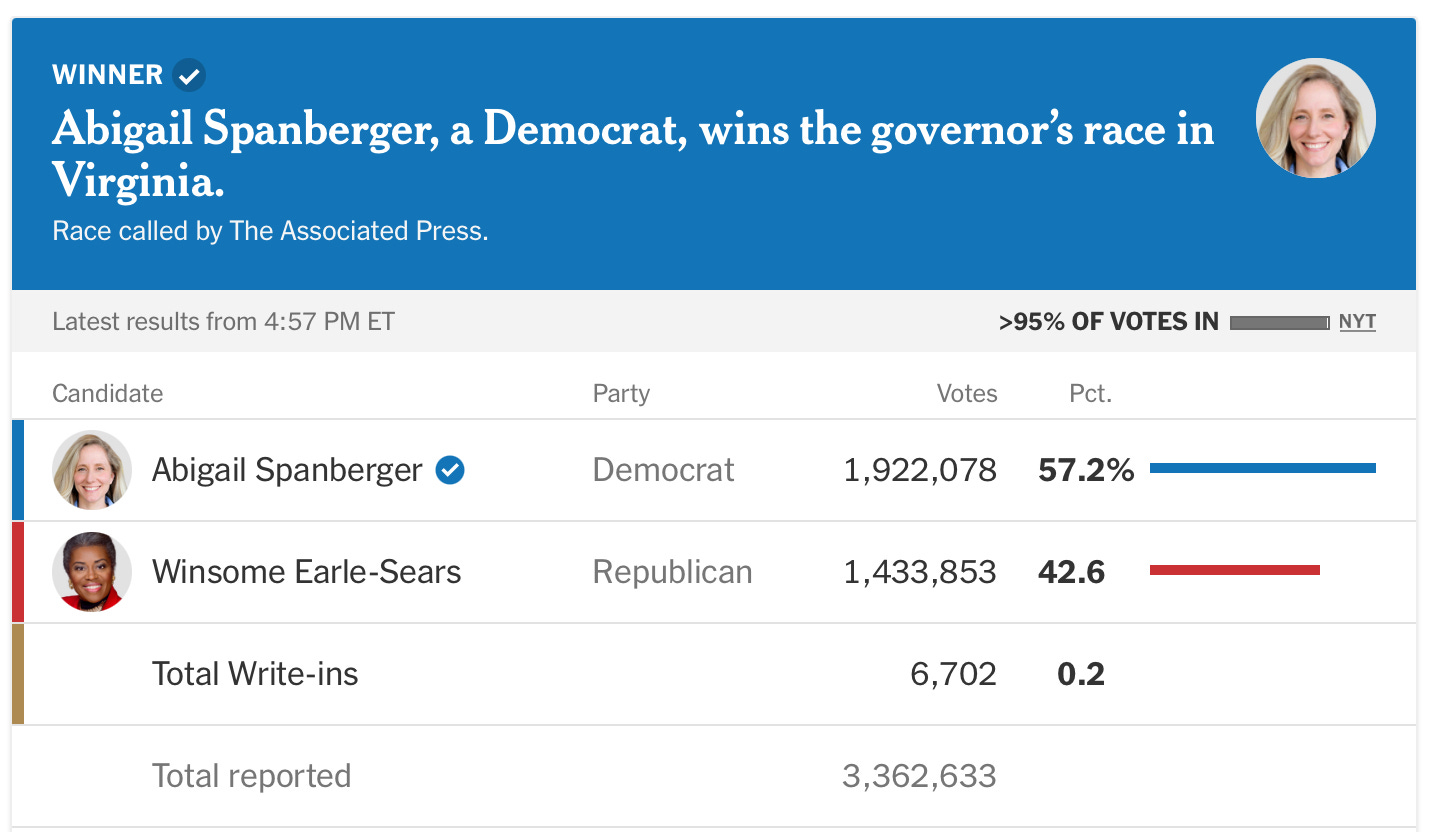Why Off-Year, Midterm, and Special Elections Suck + It’s Still the Mail-In Voting
Closing the books on Election Meltdown 2025 and helping readers manage expectations so we don’t make the same analytical mistakes in 2026 and beyond.
Today is as good of a day as any to finalize discussion of the November 2025 elections and move into the entryway of what is certain to be another turbulent year in the political space with the 2026 midterms. Honestly, I’m thankful none of the major elections Tuesday were lost in legitimate red states or the Internet would be entirely unbearable right now, instead of just a minor nuisance.
The reality is that the four states I profiled Monday are blue states. Two of them are so blue no Republican has carried their electoral votes since 1988, and another, not since 1984. Then there is the annoying issue of precedent, which I have been screaming about all week. In Virginia, 12 of 13 gubernatorial races since 1977 have gone to the party not in the White House, making it all but certain Abigail Spanberger would win from the moment she won her party’s nomination. With the exception of 1989, which featured a race down to the wire, no Republican gubernatorial candidate in Virginia has finished closer than 5.1% under a Republican president in the last half-century. Similar dynamics exist in New Jersey, with headwinds typically against the President’s party and a GOP gubernatorial candidate only electable under a Democrat president. Chris Christie earned his place in Garden State history under the reign of Barack Obama.
And if you’re still utterly shocked a Democrat - and a radical one at that - won the mayoral race in New York City, you need to change what you’re reading altogether.
It’s not that I’m trying to get you to embrace losing. It’s that I’m trying to get you to embrace having realistic expectations, so you can see the electoral map like I do when the entire slate of seats is up for grabs and make wise choices as to which ones to invest your time, energy, and money in. The Republican Party is already busy ignoring people with valuable information and talking about going after deep blue seats next November when they should be looking to defend or target about 15% of all House seats that are likely to flip. We have more access to information than any people ever before, yet less discernment as a whole; when I say 20 of 23 midterms since 1934 have seen the President’s party lose seats (and with an average of 27 lost), then that means the strategy for 2026 should be much narrower than those we are hearing about from pundits, thereby allowing full concentration of resources into the races that matter most.
But why do off-year, midterm, and special elections damage the President’s party so much? Is it just a Trump thing?
I’m afraid this isn’t unique to Trump. Even Ronald Reagan, thought to be the greatest Republican president of the 20th century, got smoked in both of his midterms. He was still strong enough to win 49 states in 1984, and left enough of an impact to get George H.W. Bush elected in 1988 - the only time a party has won three consecutive terms in the White House since the end of World War II.
Here is what happens in an off-year, midterm, or special election:
Fewer people turn out. Current ballot totals show 3,362,633 votes cast in the gubernatorial race (Spanberger +14.6%). There were 4,505,941 votes cast in last year’s presidential race, and Trump (in a losing effort) topped Earle-Sears by over 600,000 votes, and Spanberger by over 150,000. Spanberger lags Harris by over 400,000.
Turnout is low because there isn’t as much social pressure to go vote. There is also voter fatigue (growing tired of non-stop elections and politics), and residents of a state may not know or care as much about the issues, or view them as life-or-death topics as portrayed by the mainstream media during presidential campaigns. Republicans may not fear the relatively unknown Democrat candidates as they do someone like Hillary Clinton or Kamala Harris, and in almost all cases, supporters of the President’s party are passive and generally less angry about politics than they were when the other party was in power, and therefore less likely to turn out in great numbers.




